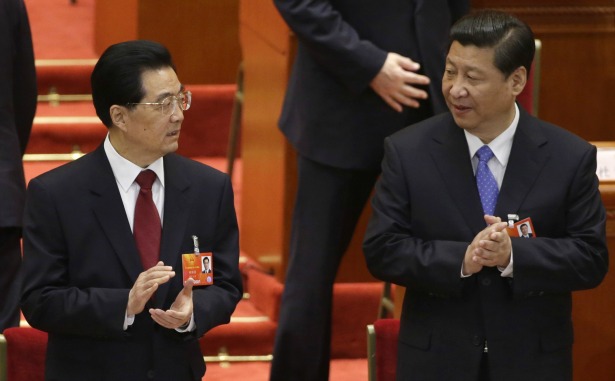Was Hu Jintao a Failure?
The Chinese president's obsession with stability may prove costly for his country.

Hu Jintao (left) and his successor Xi Jinping (Jason Lee/Reuters)
The media attention given to President Hugo Chavez' death in Venezuela has overshadowed the near-simultaneous exit of another crucial world leader: China's president Hu Jintao. Alas, the circumstances between the two couldn't be more different. The bombastic, telegenic Chavez had long been ill, but his death still came as a shock to the country he had so energetically transformed. Meanwhile, Hu Jintao's exit is as composed, orderly, and dull as the man himself.
Environmental Problems
China had a pollution problem prior to Hu's arrival, but without a doubt these issues have become far more serious in recent years. Beijing's blackened skies get most of the attention, but groundwater pollution, soil erosion, desertification, and river contamination have also produced their share of headlines. In fairness to Hu, China made green issues a government priority for the first time and invested heavily in clean energy during his tenure. But the grim problems speak for themselves.Income Inequality
As impressive as China's economic growth has been, income inequality has emerged as a major threat to the country's social fabric, creating a society of haves and have-nots that is getting worse before it gets better. Class divisions, a cause of two 20th century revolutions in the country, seem to be coming back with a vengeance. For every newly minted Chinese billionaire, there are hundreds of rural migrants -- many of whom with college degrees -- who cannot find their way into prosperity.Foreign Policy Woes
Ever since former leader Deng Xiaoping advocated that China keep a low profile in international affairs while focusing on development, Beijing has basically done just that. But in the last few years, China has deviated from this path by aggressively defending its interests in the East China Sea, effectively claiming an entire swathe of ocean for itself. This strategy -- popular among China's ultra-nationalists -- has done little in strategic terms but push countries like Japan, South Korea, Vietnam, and the Philippines even further in the United States' camp. Even China's forays into places like Africa, celebrated as an example of Beijing's ideologically-free style of diplomacy, have led to growing and significant blowback.****
These are just three examples, and it wouldn't be difficult to come up with several more. But the overall sense is this: if Hu is a failure, it's because of things he didn't do, not things he did. When he entered office, China suffered from corruption, repression, inequality, and an unsustainable trajectory. These problems are not only still there, but they've gotten far worse.
In fairness to Hu, he isn't entirely to blame: like their American counterparts, Chinese presidents must manage quarreling factions and interest groups in the government and cannot simply do what they want. But Hu's lackluster performance in office is symptomatic not of his personal foibles but rather the system in which he operates. Hu ascended the ranks of the Chinese Communist Party not because he was charismatic and innovative, but for precisely the opposite reason: he put his head down, did what he was told, and was unquestionably loyal to the Party's grip on power.
Without question, Hu Jintao managed to achieve one of his primary goals as president: "not rocking the boat". But in doing so, he inadvertently steered China toward a choppier, more perilous future.